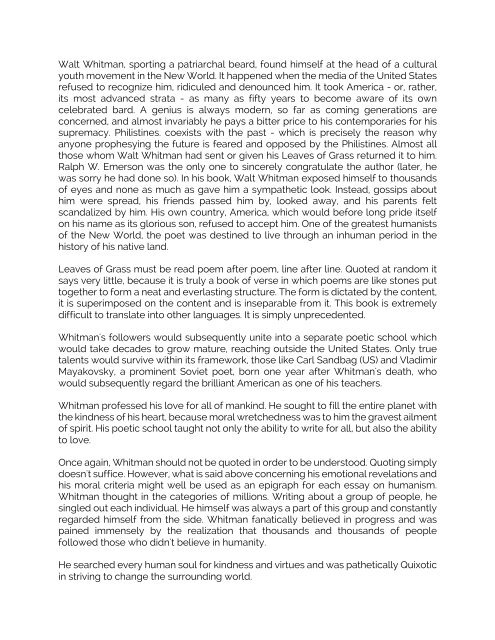PoetsGardenArrowParkNY_dl
Create successful ePaper yourself
Turn your PDF publications into a flip-book with our unique Google optimized e-Paper software.
Walt Whitman, sporting a patriarchal beard, found himself at the head of a cultural<br />
youth movement in the New World. It happened when the media of the United States<br />
refused to recognize him, ridiculed and denounced him. It took America - or, rather,<br />
its most advanced strata - as many as fifty years to become aware of its own<br />
celebrated bard. A genius is always modern, so far as coming generations are<br />
concerned, and almost invariably he pays a bitter price to his contemporaries for his<br />
supremacy. Philistines. coexists with the past - which is precisely the reason why<br />
anyone prophesying the future is feared and opposed by the Philistines. Almost all<br />
those whom Walt Whitman had sent or given his Leaves of Grass returned it to him.<br />
Ralph W. Emerson was the only one to sincerely congratulate the author (later, he<br />
was sorry he had done so). In his book, Walt Whitman exposed himself to thousands<br />
of eyes and none as much as gave him a sympathetic look. Instead, gossips about<br />
him were spread, his friends passed him by, looked away, and his parents felt<br />
scandalized by him. His own country, America, which would before long pride itself<br />
on his name as its glorious son, refused to accept him. One of the greatest humanists<br />
of the New World, the poet was destined to live through an inhuman period in the<br />
history of his native land.<br />
Leaves of Grass must be read poem after poem, line after line. Quoted at random it<br />
says very little, because it is truly a book of verse in which poems are like stones put<br />
together to form a neat and everlasting structure. The form is dictated by the content,<br />
it is superimposed on the content and is inseparable from it. This book is extremely<br />
difficult to translate into other languages. It is simply unprecedented.<br />
Whitman's followers would subsequently unite into a separate poetic school which<br />
would take decades to grow mature, reaching outside the United States. Only true<br />
talents would survive within its framework, those like Carl Sandbag (US) and Vladimir<br />
Mayakovsky, a prominent Soviet poet, born one year after Whitman's death, who<br />
would subsequently regard the brilliant American as one of his teachers.<br />
Whitman professed his love for all of mankind. He sought to fill the entire planet with<br />
the kindness of his heart, because moral wretchedness was to him the gravest ailment<br />
of spirit. His poetic school taught not only the ability to write for all, but also the ability<br />
to love.<br />
Once again, Whitman should not be quoted in order to be understood. Quoting simply<br />
doesn't suffice. However, what is said above concerning his emotional revelations and<br />
his moral criteria might well be used as an epigraph for each essay on humanism.<br />
Whitman thought in the categories of millions. Writing about a group of people, he<br />
singled out each individual. He himself was always a part of this group and constantly<br />
regarded himself from the side. Whitman fanatically believed in progress and was<br />
pained immensely by the realization that thousands and thousands of people<br />
followed those who didn't believe in humanity.<br />
He searched every human soul for kindness and virtues and was pathetically Quixotic<br />
in striving to change the surrounding world.


